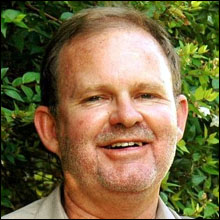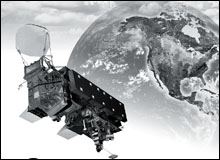SAEON is geared for climate change research
|
- By Johan Pauw, Head of SAEON
The recent release of the Department of Science and Technology’s Ten Year Strategy is of particular significance for SAEON. The strategy identifies climate change as one of the “grand challenges” for the Department to address in the next ten years until 2018. This is a welcome and timely direction and creates an elevated niche within the National Science System for SAEON and its partners in which to function.
Climate change research will require an expanded array of disciplines to address all related issues, to name a selection: in situ and space-based Earth observation to monitor and explain environmental change, technological solutions to reduce greenhouse gas emissions, improved capability to predict and withstand weather patterns and disasters, prediction and prevention of environmentally-linked diseases, management of floods and droughts, agricultural production and fisheries in a changing environment, large-scale planning of land-use, energy management, management of national and sectoral economies, intergovernmental negotiation, social welfare management, planning and maintenance of national infrastructure and defence, and conservation of biodiversity.
Promoting inter-organisational synergy
A first reaction to the Strategy would be to establish an all-encompassing Climate Change Institute at the national level, but due to limited existing human capacity and financial resources in South Africa, this seems hardly feasible. Instead, the route SAEON would propose is a national secretariat for climate change research to facilitate the flow of information among the different role players. This facilitation, supported by strategic funding mechanisms, should hopefully lead to a concerted effort by the players to work complementary and synergistically.
For starters, the proposed secretariat would need to revisit the outcomes of the Country Study on Climate Change, which was performed by a multidisciplinary cohort in the late 1990s. The Country Study was performed under the auspices of the Department of Environmental Affairs and Tourism and managed by the then Foundation for Research Development (FRD). The Country Study would serve as a useful baseline for the new climate change initiative. A considerable number of players have been working on climate change issues since then, but not much cross-sectoral work has been done yet. The Secretariat should also be advised by the interdepartmental National Climate Change Committee and the International Council for Science (ICSU) National Scientific Committee for Global Change.
Tracking the impact of climate change
The evolvement of SAEON, with its objective of distinguishing between changes caused by climate change versus natural or anthropogenic changes, places it in a key position within the greater climate change research strategy. This is not to say that SAEON will resolve the relevant climate change issues in the next ten years. Instead, SAEON’s role would be to track the impact of climate change and to support analysis and modelling of systemic drivers and responses on the basis of consistent long-term records. The understanding gained in the process would be of critical importance to the development of climate change adaptation strategies, policies and technologies.
That said, it should be recognised that SAEON is not a stand-alone institute with turf to defend. SAEON is already a facilitator and coordinator of in situ Earth observations among the wide range of organisations that participate and are served by SAEON.
In addition, SAEON’s role in capacity building in the field should not be disregarded, as it is clear that climate change will be still with us long after the life of the present Ten Year Strategy of the Department of Science and Technology.












